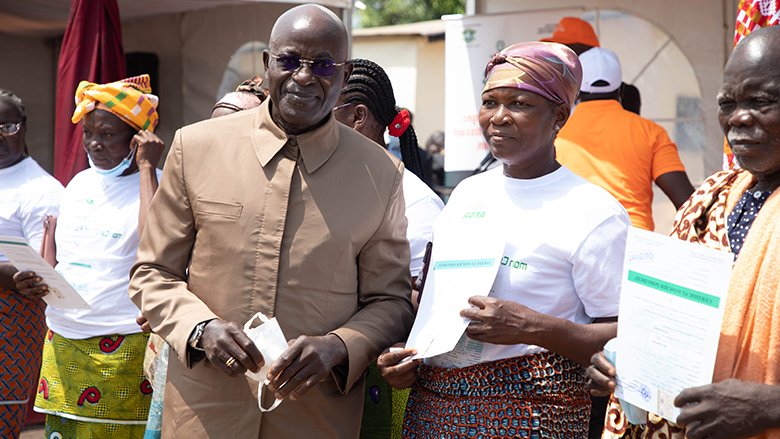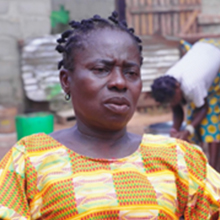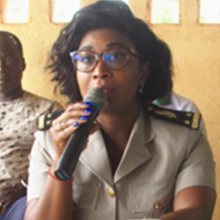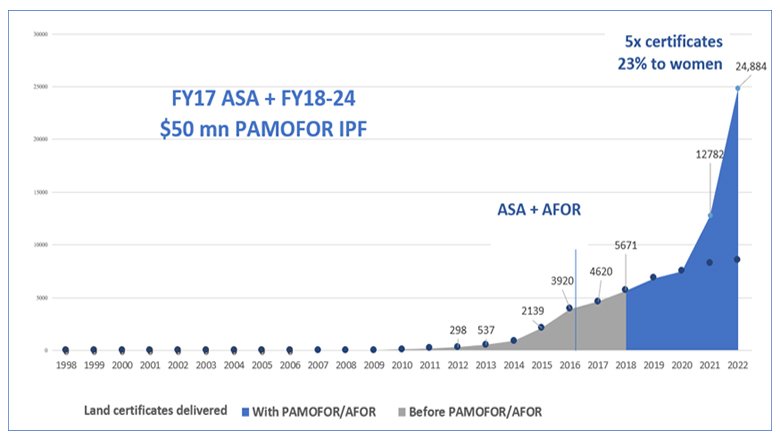Challenge
Host communities in Côte d’Ivoire have welcomed migrants — and more recently refugees — for generations. However, land disputes—especially between migrants and host communities—have become more common in recent years. Without written land records, it is difficult to resolve such cases. As a result, land disputes have led to violence and civil conflict since 2010. The lack of registered land rights (only 1 percent of all rural lands have land records) also contributes to deforestation, since the government can allocate logging permits to private companies on unregistered land. Without clear boundaries between forests and farmlands, it is also difficult to verify whether agricultural commodities were produced on recently deforested land, thereby hindering traceability, as well as the sustainability of value chain efforts.
Approach
Clarifying customary rights to rural land is critical to addressing the key drivers of fragility and poverty in Côte d’Ivoire. Since 2018, the World Bank-financed Land Policy Improvement and Implementation Program (Projet d’Amélioration et de Mise en Œuvre de la Politique Foncière Rurale, PAMOFOR) has been supporting the government in enacting legal, regulatory, and institutional reforms. Funded through the International Development Association (IDA), PAMOFOR aims to establish the infrastructure, institutions, and capacity needed to significantly scale-up customary rural land registration. With PAMOFOR support, the government of Côte d’Ivoire has established a strong Rural Land Agency, including local branches in six regions and 16 departments. It also strengthened village land committees, and developed a new web-enabled digital rural land registry. In addition, it supported local universities and training institutions to develop and deliver new vocational and graduate degree programs to train the next generation of land sector professionals throughout the region, as well as upgraded the national geodetic infrastructure to increase surveying accuracy.
Through PAMOFOR, the government also piloted simplified systematic land registration procedures and interventions to strengthen women’s customary land rights. These interventions include promoting formalization of customary marriages, as well as and encouraging husbands to voluntarily transfer some of their family’s land to their wives — and register this land in the wife’s name. For the first time, both landowners and tenants (including women) can now benefit from land records at no cost to them.
Based on these pilots, the government has also enacted key reforms, including simplifying the land registration procedures. Also, in 2023, the Council of Ministers adopted the National Rural Land Registration Program to scale up customary land registration nationwide. Neighboring countries have also taken note. Other governments in the region are increasingly interested in learning from Côte d’Ivoire’s success. Indeed, government officials have undertaken study tours and requested World Bank support to transform their own land administration systems.
Results
Building on World Bank analysis, an ongoing investment project financed by the International Development Association (IDA) piloted systematic and more inclusive procedures for registering customary ownership. By 2023, PAMOFOR helped the government to deliver over 33,000 land certificates (including 22 percent to female landowners), benefiting an estimated 184,000 people, and 11,000 land use contracts. An additional 20,000 certificates and 74,000 contracts are expected to be delivered this year.
World Bank financing has also helped Côte d’Ivoire:
- Hire and train over 140 staff for the new Rural Land Agency and establish satellite offices across six regions and 16 departments;
- Strengthen 400 village land committees;
- Develop and operationalize a web-enabled digital rural land registry;
- Build four Continuously Operating Reference Stations, which are helping to improve surveying accuracy; and
- Train 10,467 community, government, and private sector stakeholders (including 19 percent to women).
These results—coupled with strong demand from both beneficiaries and the government for expanding rural land registration nationwide—have motivated the World Bank to finance a new results-based financing operation. This operation will start financing land registration across half of the country in 2024.



